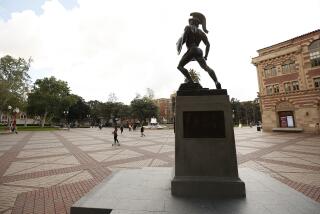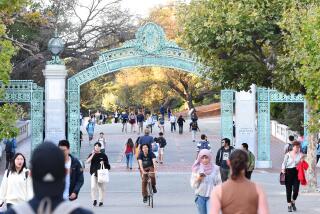Customized Books From Computer in Works at UCSD
- Share via
In the first such effort at any university, UC San Diego professors will soon be able to order customized books from a menu of texts and journals stored in a computer--then have them printed, bound and available in the campus bookstore within hours.
The agreement, which was announced Wednesday between UCSD and McGraw-Hill of New York, one of the nation’s largest publishers of academic texts and journals, will take on-demand electronic printing to its most advanced marketing test yet.
USC will begin a similar experiment early next year with the same system.
The arrangement represents the latest technological wrinkle in a rapid revolution involving the gathering and distribution of information at universities. The new system promises fresher, more relevant information for college texts, an end to copyright problems and gives professors faster access to writings.
Among related advances, San Diego State University is about to put all required book and journal excerpts into a database so students will be able to call them up on computer terminals in library reserve areas and make individual printouts.
At USC, the Center for Scholarly Technology is experimenting with a variety of systems to work out problems of speed, quality and copyright law. The center is also working on ways to get students and professors to accept and use text from computers rather than paper.
The Assn. of Research Libraries in Washington has formed a coalition with publishers and others to push for standardized technology so that the increasing number of uses that come on-line will be compatible with each other.
“What we’re seeing today is only the birth of what will bring a wealth of new ways that libraries and others must adapt to,” said Peter Lyman, associate dean for library technology at USC.
Under the arrangement with UCSD, McGraw-Hill will make available on a database known as Primis an extensive inventory of its texts and journals. Within the next several months, professors will be able to use a terminal in the UCSD bookstore to mix and match chapters, articles and even unpublished manuscripts into a cohesive textbook.
For example, a professor teaching a course on modern European politics can choose up-to-the-minute material encompassing all the changes in that part of the world--rather than having to rely on a standard text hopelessly out of date no matter how recently it was published.
After professors make their selections, the bookstore will transmit the order to a high-speed printer in the UCSD graphics shop, where as many as 90 pages of book-quality type can be printed every minute. Within hours, the selections will be printed, bound and ready for sale.
The system could eventually be expanded so that professors can put orders together from their own office computers.
Until now, the McGraw-Hill customized system required professors at various universities to send requests to the publishing company, which arranged the texts and shipped them back to the campuses.
Robert Meigs, an accounting professor at SDSU, put together the first custom text under the system last year, and it is used across the country.
Laura Long, an assistant vice chancellor for business services at UCSD, said the university invested about $400,000 in the necessary computer and printing equipment for the project, but that McGraw-Hill waived the first-year fees for the “language” to run the system. The price of the customized texts will include royalty costs of the books and journals involved, as determined by McGraw-Hill, as well as a profit for the campus bookstore.
USC’s Lyman said a major issue is whether these texts will be cheaper than traditional textbooks and whether they will be as convenient as simply having copy shops reproduce desired pages from publications.
But Lyman emphasized that the Primis system offers a way to deal with copyright problems plaguing professors who have gone the copy shop route.
Kinko’s Graphics Corp., a Ventura-based national chain of copy shops, was successfully sued last spring by eight major publishers for violating copyrights by reproducing and binding tens of thousands of professor-produced custom anthologies, without first obtaining permission from the authors.
As a result, many professors around the country discovered this fall that copy shops were returning their course packets with missing articles because there was no proof that copyright permission had been obtained. That is part of the reason for SDSU’s new system, which allows students to make individual copies of articles or chapters, then records the transaction to give publishers a mechanism for receiving royalties.
But for the project to succeed fully, other publishers must either become part of the McGraw-Hill system through a cooperative venture or set up their own databases.
More to Read
Sign up for Essential California
The most important California stories and recommendations in your inbox every morning.
You may occasionally receive promotional content from the Los Angeles Times.













